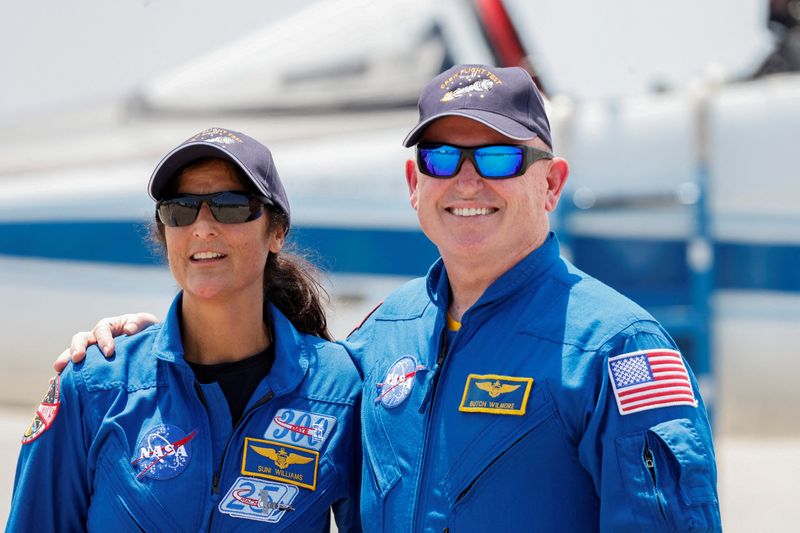By Joey Roulette
WASHINGTON (Reuters) - Boeing (NYSE:BA) is poised to send the first Starliner space capsule with a crew of humans into orbit next week, giving it a long-delayed chance to score a badly needed win as it struggles to compete with Elon Musk's SpaceX.
The CST-100 Starliner test mission, a years-delayed milestone after more than $1 billion in cost overruns, will ferry two NASA astronauts to the International Space Station (ISS) in a final demonstration before the spacecraft can be approved to fly routine space trips under the space agency's commercial crew program.
NASA in recent years has backed a new generation of privately built spacecraft that can ferry its astronauts and other customers to the ISS and, under its more ambitious Artemis program, to the moon and eventually Mars. Starliner is the latest product of the agency's commercial-leaning model.
"The first crewed flight of a new spacecraft is an absolutely critical milestone," NASA associate administrator Jim Free told reporters in a pre-launch news conference. "The lives of our crew members, Suni Williams and Butch Wilmore, are at stake."
Williams, 58, is a former Naval test pilot with experience flying over 30 different aircraft, and has logged 322 days in space over two missions since her first flight in 2007. Wilmore, 61, a retired Navy captain, has logged 178 days in space since his first of two space missions in 2009.
Starliner, a gumdrop-shaped pod with room for up to seven astronauts, has come to symbolize Boeing's struggles to compete with new space rivals like SpaceX, whose Crew Dragon spacecraft flew its first human mission in 2020.
A 2019 attempt to send an uncrewed Starliner to the ISS for a week failed, returning to Earth several days early, because of dozens of software and engineering issues.
That mission reshaped Boeing's decades-old relationship with NASA and marked the first of many more high-profile issues the company would encounter with Starliner, which is on a fixed-price contract for development and scheduled to fly six NASA astronaut missions once certified as safe for flight.
The development woes have cost Boeing more than $1.5 billion in charges, and NASA roughly $325 million in boosts to Boeing's $4.2 billion fixed-price Starliner contract, according to securities filings and contracting data examined by Reuters.
Meanwhile, SpaceX's Crew Dragon has obtained several more flights from NASA as Boeing's Starliner remains in development. Boeing in 2022 made a second, successful attempt to launch Starliner to the ISS and back.
NASA officials have doubled their oversight of Starliner since the 2019 failure and argue that Boeing's experience building and maintaining modules on the ISS should be a confidence booster.
"Knowing firsthand the ins and outs of NASA, this launch would not be happening if there wasn't an enormous amount of confidence in the Starliner achieving its objectives," Jim Bridenstine, the previous NASA administrator, told Reuters.
The agency wants the redundancy of having two different U.S. rides to the ISS, an international science laboratory in Earth's orbit that is expected to retire around 2030 after continuously housing astronauts for three decades.
NASA is backing private development of new space stations that could replace the ISS after its retirement, potentially giving Starliner new destinations.
NASA's Commercial Crew Program sought to allow companies to sell spacecraft services to private customers, which SpaceX but not Boeing has done. The per-seat cost for SpaceX's Crew Dragon is estimated at $55 million, while Starliner's is $90 million, according to NASA's inspector general.
Boeing and NASA are targeting 10:34 p.m. ET on Monday (0234 GMT on Tuesday) for Starliner's launch from Kennedy Space Center in Florida.
